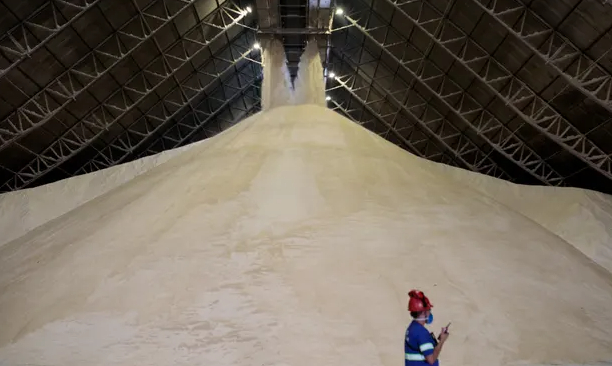May 21, 2025 | 09:05 GMT +7
May 21, 2025 | 09:05 GMT +7
Hotline: 0913.378.918
May 21, 2025 | 09:05 GMT +7
Hotline: 0913.378.918

Sugar at a Copersucar warehouse in Santos, Brazil. The company sold €1bn of sugar to Europe in 2020. Photo: Patricia Monteiro/Bloomberg/Getty
Pesticides banned in the EU because of their links to human health risks are being exported and used on farms in Brazil supplying Nestlé, an investigation has revealed.
Europe is home to some of the world’s biggest and most profitable chemical companies, including the Swiss-based Syngenta and the German multinationals BASF and Bayer.
But a number of the pesticides and fungicides they produce have been banned by European health officials after they were linked to cancer, reproductive problems and neurodegenerative diseases.
Despite the ban, millions of pounds worth of the products are still being exported to Brazil, where they are used on farms that supply the international sugar market, according to a new investigation by Lighthouse Reports and Repórter Brasil.
Documents from the Brazilian agriculture ministry obtained through a freedom of information request reveal that a fungicide made by BASF and based on epoxiconazole, a chemical banned in the EU, was sprayed over two sugar plantations that supply Nestlé.
One of the farms using this banned fungicide is part of the giant Brazilian sugar corporation Copersucar, which sold €1bn (£880m) of sugar to Europe in 2020.
In São Paulo state, Usina Atena, a Brazilian sugar plantation, is under investigation after a complaint from a neighbouring resident about the health impacts from the spraying of chemicals on the farm.
Justice ministry officials in São Paulo found the farm had the Syngenta fungicide Priori Xtra. This contains the active substance cyproconazole, which is banned for use in the EU.
They also found the insecticide Regent 800WG, produced by BASF, and Certero, made by Bayer, which include the active ingredients fipronil and triflumuron. Both substances are banned in the EU.
The ECHA has classed epoxiconazole as a suspected carcinogen, and similar concerns were highlighted by the European Food Safety Authority (EFSA).
Marcos Orellana, UN special rapporteur on toxics and human rights, called the continued export of the chemicals by EU-based companies an “abhorrent practice” and urged the EU to implement a ban.
CropLife International, which represents agri-chemical companies including BASF, Bayer and Syngenta, said the active ingredients in the pesticides had “valid use registrations in several OECD countries”.
It said in a statement: “A non-registration or deregistration in the European Union does not automatically mean a product cannot be used in another country. Pesticides are not automatically ‘more hazardous’ or ‘less necessary’ because they are not authorised in Europe.”
Bayer and BASF maintain that all their products are safe for humans and the environment.
Copersucar said it complied with Brazilian and international legislation, exporting its products within safety standards in the regions where it operates.
A spokesperson for Nestlé said all its suppliers must meet Nestlé’s responsible sourcing standard, including in relation to good agricultural practices. “We continue to closely follow regulatory developments everywhere we operate to ensure full compliance for all our products. Nestlé is not involved in campaigning against an export ban on pesticides and active ingredients banned in the EU.”
Officials at DG Sante, the EU body responsible for regulating pesticides, said the export of banned pesticides would be phased out in line with the chemicals strategy for sustainability, although no timetable had been set for implementation.
(The Guardian)

(VAN) Attempts to bring down the price of the Japanese staple have had little effect amid a cost-of-living crisis.

(VAN) Fourth most important food crop in peril as Latin America and Caribbean suffer from slow-onset climate disaster.

(VAN) Shifting market dynamics and the noise around new legislation has propelled Trouw Nutrition’s research around early life nutrition in poultry. Today, it continues to be a key area of research.

(VAN) India is concerned about its food security and the livelihoods of its farmers if more US food imports are allowed.

(VAN) FAO's Director-General emphasises the need to work together to transform agrifood systems.

(VAN) Europe is facing its worst outbreak of foot-and-mouth since the start of the century.

(VAN) The central authorities, in early April, released a 10-year plan for rural vitalization.